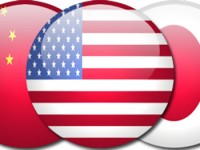Dec 10, 2014
Jin Ying warns the U.S. to be weary of Japan, citing their history of “running away with the bone” as the U.S. and China jostle for influence in the Pacific. Ying agrees with Democratic advisor Zbigniew Brzezinski that the U.S. should sign a major charter with China, just as it did with Britain during WWII.
Zhou Bo, Senior Fellow, Center for International Security and Strategy, Tsinghua University
Nov 19, 2014
Zhou Bo posits that an essential component to improving frosty Japan-China relations is an equal commitment to develop shared maritime procedures, such as the Code for Unplanned Encounters at Sea (CUES). But first, the two sides need to agree upon a common Air Defense Identification Zone (ADIZ).

Richard Weitz, Senior Fellow, Hudson Institute
Nov 17, 2014
Although Xi and Abe agreed to deemphasize their conflict over the East China Sea, past efforts in this direction have not proved successful for long. Last month’s release of the interim report on Japanese-U.S. progress in revising their defense guidelines has become the latest object of Chinese concern.

Franz-Stefan Gady, Associate Editor, Diplomat
Nov 12, 2014
Japan and the US are revising defense guidelines for the first time since 1997, and though not explicit, China’s sovereignty claims are the cause. Yet both Japan and China are making slight efforts to defuse escalation and reemphasize communication.
Curtis S. Chin, Former U.S. Ambassador to Asian Development Bank
Jun 26, 2014
Given recent territorial moves by China, as well as heightened aggressive rhetoric, Curtis Chin analyzes the parallels between China currently and Japan as it existed in the past. Additionally, Chin asserts that the world’s powers should work to lower tensions so that peace and prosperity can exist in the Asia-Pacific region.
Fu Mengzi, VP, China Institutes of Contemporary Int'l Relations
May 07, 2014
China and the US are big countries in the Asia-Pacific. China appreciates a constructive US presence in the region. But it will also be unequivocally opposed to the US endangering Chinese national interests while developing ties with other Asia-Pacific nations, writes Fu Mengzi.
Stephen Harner, Former US State Department Official
May 07, 2014
Following the first visit to Japan by a U.S. president in nearly two decades, Stephen Harner examines President Barack Obama’s recent tour of four East Asian nations in order to truly understand how U.S.-Japan relations are advancing and what this means for the future of Sino-U.S. relations given current tensions between China and Japan.
Shi Yinhong, Professor, Renmin University
Apr 01, 2014
Sino-Japanese relations have been strained due to confrontations regarding the Diaoyu Islands and state visits to the Yasukuni Shrine by Japanese leaders. In order to mitigate these tensions, it is imperative that the Chinese government adjusts its official policies in order to shift the international perception of Japan in their favor.
Lu Yaodong, Researcher, Chinese Academy of Social Sciences
Feb 28, 2014
Japanese Prime Minister Shinzo Abe, with the political support of right wing conservative forces, is seeking to amend Article 9 of the Constitution, which stipulates that Japan is no longer able to maintain a standing army, navy and air force, and forfeits all rights to belligerency.
Franz-Stefan Gady, Associate Editor, Diplomat
Feb 25, 2014
China trusts the United States to act rationally in Asia, but not so with Japan; its aggressive behavior is the real danger to China, writes Franz-Stefan Gady.